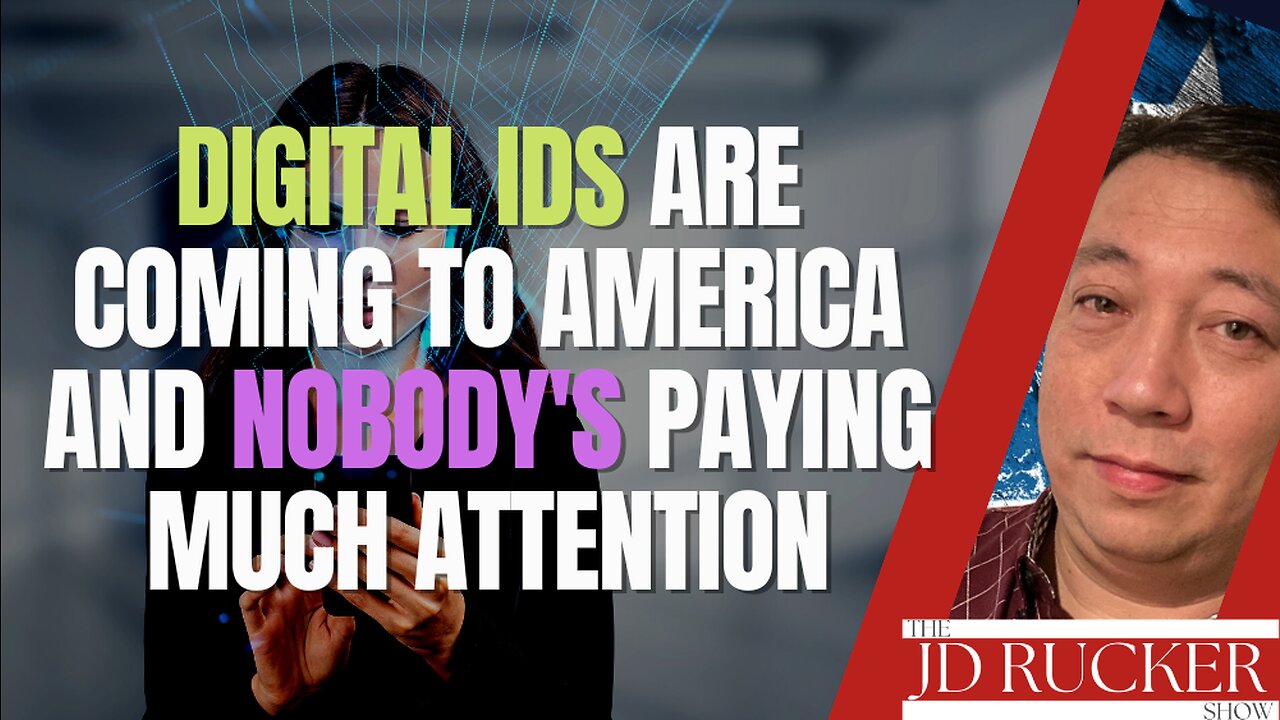Premium Only Content

Digital IDs Are Coming to America and Nobody's Paying Much Attention
When a story broke last week that Congress had taken another big step toward rolling out digital IDs, I expected it to be huge news among conservative and alternative news outlets. Nope. I completely overestimated the impact of the article posted by Just The News, an article that unfortunately downplayed its own reporting.
Generally speaking, I love what John Solomon and his group do for journalism. The vast majority of their stories are straight news which is something we desperately need more of in America. State the facts and let the people make up their own minds — that's what I'd love to see. Instead, we have "news" that's tilted one way or the other and almost always to the left for corporate media. I have no problem with opinion pieces, but disguising opinions as "news" is not journalism.
The story in question was titled, "National Digital ID Clears Congressional Hurdle Amid Fears It Could Be Politically Abused." Here are the important parts:
A national digital ID system for U.S. citizens is fast becoming a reality following a vote by the U.S. Senate Homeland Security and Governmental Affairs Committee to advance the Improving Digital Identity Act.
Digital IDs act as online, data-laden representations of human beings. Many analysts, such as the authors of a 2019 McKinsey Global Institute report, argue they could be the key to unlocking access to financial services, various government benefits and educational opportunities, as well as a number of other critical services. Some of the same analysts, however, also warn that the "risks and potential for misuse of digital ID are real and deserve careful attention."
Although the concerns about digital IDs are real, it's important to separate the facts from the fearmongering fiction. In simple language, a digital identity enables an individual to prove who they are in the virtual world. Proponents claim digital IDs offer greater privacy than traditional forms of identification and can help minimize some of the risks associated with physical documents such as driver's licenses, passports, etc. Others, though, are quick to sound the alarm, warning that the introduction of digital IDs will almost certainly lead to an erosion of civil liberties.
"Digital is often touted as the 'future,' and many people cast such a transition as inevitable," writes Jay Stanley, a senior policy analyst at the ACLU, who believes digital IDs could prove to be a privacy nightmare. "But digital is not always better — especially when systems are exclusively digital."
"There’s a reason that most jurisdictions have spurned electronic voting in favor of paper ballots, for example," Stanley writes. With voting software in some states vulnerable to outside interference, paper ballots increasingly appear to be much safer.
Similarly, digital IDs are vulnerable to attack. Horror stories involving people's identities being stolen are not uncommon. Remember, digital IDs are synonymous with data, and if there is one thing hacker's love, it's data — especially the data of U.S. citizens.
As I noted, the article downplays the threats of a digital ID in the United States. The reality is a digital ID is a requirement in order for the powers-that-be to fully implement their machinations, whether you want to call it Build Back Better, the 4th Industrial Revolution, or The Great Reset. An article by Dr. Joseph Mercola highlights the risks further: https://articles.mercola.com/sites/articles/archive/2022/10/28/digital-id-has-arrived.aspx
On today's episode of The JD Rucker Political Report, I explained why this is such a threat and continued on to other stories that demonstrate the perfect economic storm we're in right now. It's going to get worse before it gets any better, if at all, which is why we strongly recommend picking one of our America First precious metals companies to move investments and retirement as soon as possible: https://jdrucker.com/gold
-
 2:03:31
2:03:31
The JD Rucker Show
13 days agoThe JD Rucker Show LIVE: JFK Files, Cassidy Propositioned, AI, CBDC Ban, Dirty Politico, and More
2.54K3 -
 4:26
4:26
Lara Trump
2 years agoPay attention AMERICA!
3.17K23 -
 2:21
2:21
Please see JvNewz
2 years agoComing to America from Russia
94 -
 0:51
0:51
UnderCreate
2 years agoJohnny isn't paying attention Funny jokes
66 -
 2:54
2:54
Nothing To See Here
2 years agoDigital IDs, Digital Currency, Digital Vaccination Certifications, its all coming.
84 -
 1:17:05
1:17:05
Right Side Broadcasting Network
6 hours agoLIVE REPLAY: President Trump Signs Executive Orders - 2/6/25
71.7K32 -
 LIVE
LIVE
G2G Gaming Channel
7 hours agoHelmet Day! Hope i dont need goggles too! #RumbleGaming
174 watching -
 LIVE
LIVE
Barry Cunningham
3 hours agoTRUMP DAILY BRIEFING: PRESIDENT TRUMP, ELON MUSK, AND KASH PATEL HAVE THE DEMS FREAKING OUT!
1,881 watching -
 1:58:03
1:58:03
The Charlie Kirk Show
5 hours agoTrump the Promise-Keeper + The New White House Press Corps | Gaines, Davis, Leavitt | 2.6.2025
133K31 -
 1:25:41
1:25:41
CrackingCrypto
4 hours agoBerachain Rug Alert! The Bear Market Continues Czech Removal of Capital Gains Tax
25.9K